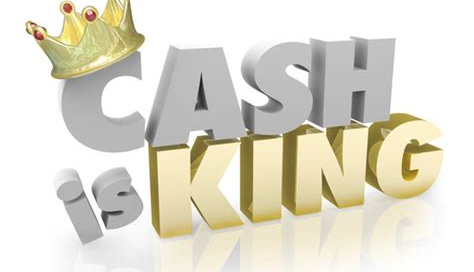Cash is King. Central Bank Digital Currency is Slavery.
Adopting digital 'money' is signing away your freedom.
I hope the writer’s conclusion below is correct. But if all else fails, in terms of global financial liquidity *and* taming the masses who are growing increasingly restless as we watch the corrupt houses of cards fall — the Banksters, Corporations, and Managerial Classes running our governments WILL wipe out the use of cash.
It’s the only way to regain control.
Admittedly, fiat currency cash itself is an illusion, since its value is nothing more than a mindset...or should I say mind-F#CK? We put our trust in the fact that it’s a legitimate form of payment for a good or service.
Also, notice how when government imposes a law or regulation on your ability to conduct business, it’s always in the name of SAFETY, online security, and even their version of privacy. Oh, and of course, to prevent money laundering — as if government money laundering will ever stop!
That’s what they want you to believe regarding the Corporate Transparency Act (which is now on pause). To me, this is a violation of the 4th Amendment, codified.
ANYHOW, Back to the CBDCs
Nigerians’ Rejection of Their CBDC Is a Cautionary Tale for Other Countries
CBDCs may be popular among central bankers, but money is ultimately a tool for the people. So long as the risks outweigh the benefits, it’s unlikely any CBDC will gain traction in Africa or elsewhere.
March 6, 2023 • Commentary
This article appeared in CoinDesk on March 6, 2023.
In Nigeria, citizens have taken to the streets to protest the nation’s cash shortage, further objecting to their government’s implementation of a central bank digital currency (CBDC). The shortage came about due to cash restrictions aimed at pushing the country into a 100% cashless economy. Yet, instead of adopting the CBDC, Nigerian protesters are demanding paper money be restored.
The country’s experience strongly suggests the average citizen understands that CBDCs present a substantial risk to financial freedom while providing no unique benefit.
It is no secret that CBDCs have been growing in popularity among central bankers, policy makers, and consultancy firms in recent years. Yet, for citizens it’s been another story. When the U.S. Federal Reserve solicited comments on CBDCs, more than two-thirds of the commenters were concerned about the risks to financial privacy, financial freedom and the stability of the banking system.
Further, CBDCs really don’t add anything novel to the market in terms of benefits for consumers. To the extent people want it, many currencies are available in digital forms through debit cards, payment apps and even prepaid cards. That much should be clear from the abysmal adoption rate in Nigeria, where less than 0.5 % of Nigerians have used the CBDC. To put that number into perspective, more than 50% of Nigerians have used cryptocurrency.
CBDCs may be popular among central bankers, but money is ultimately a tool for the people. So long as the risks outweigh the benefits, it’s unlikely any CBDC will gain traction in Africa or elsewhere.
CBDC adoption incentives in Nigeria have failed
The Nigerian government has unleashed a flurry of tricks to spur adoption but none has proven effective. To its credit, the Nigerian government initially tried to encourage use through modest measures. In August 2022, it removed access restrictions so that bank accounts were no longer required to use the CBDC. Then, in October, it offered discounts if people used the CBDC to pay for cabs.
Yet, neither effort proved to be fruitful. Put simply, Nigerians prefer cash.
Unfortunately, the Nigerian government doubled down and moved to more drastic measures by restricting cash itself. In December the Central Bank of Nigeria began restricting cash withdrawals to 100,000 naira (US$225) per week for individuals and 500,000 naira ($1,123) for businesses.
To make matters worse, the Nigerian government also chose to redesign the currency during this time in a “move aimed at restoring the control of the Central Bank of Nigeria (CBN) over currency in circulation” and to “further deepen the push to [a] cashless economy,” according to a CBN press release.
So not only are citizens limited in how much they may withdraw, but the commercial banks also don’t have the cash to give out because many are still waiting for the newly designed cash to arrive.
With these restrictions in place, the Nigerian government managed to drain the economy of cash and set the stage for the CBDC to finally have its moment in the spotlight.
‘You can’t legislate a change in behavior’
And yet, it didn’t work. Stories of Nigerians struggling with the cash restrictions quickly spread across Twitter posts, TikTok videos and other social media. Rather than turn to the CBDC, Nigerians took to the streets to protest the restrictions and cash shortage.
The new notes will, it is hoped, arrive soon, but even then Nigerians are unlikely to find relief. Central bank Governor Godwin Emefiele said, “The destination, as far as I am concerned, is to achieve a 100% cashless economy in Nigeria.”
The company that designed the Nigerian CBDC called the cash restrictions a creative use of marketing and said other countries could be expected to take similar steps. Yet, Nigeria should serve as a cautionary tale for other countries looking to launch CBDCs.
Ayokunle Olumbunmi, head of financial institutions ratings at Agusto and Co. in Nigeria, put it well when he said that the central bank “doesn’t want us to be spending cash. They want us to be doing transactions electronically, but you can’t legislate a change in behavior.”
CBDCs may be popular among central bankers, but money is ultimately a tool for the people. So long as the risks outweigh the benefits, it’s unlikely any CBDC will gain traction in Africa or elsewhere.





Hi, in Australia most people want cash, over 90% of Australians want cash a poll showed in the last few years. There is a petition to keep cash on Change.org. They had a Cash Out day here last April & an estimated 1.6 million Aussies drew out $500 million on a big vote No to a cashless society. You think that would have to be heard! 🙂